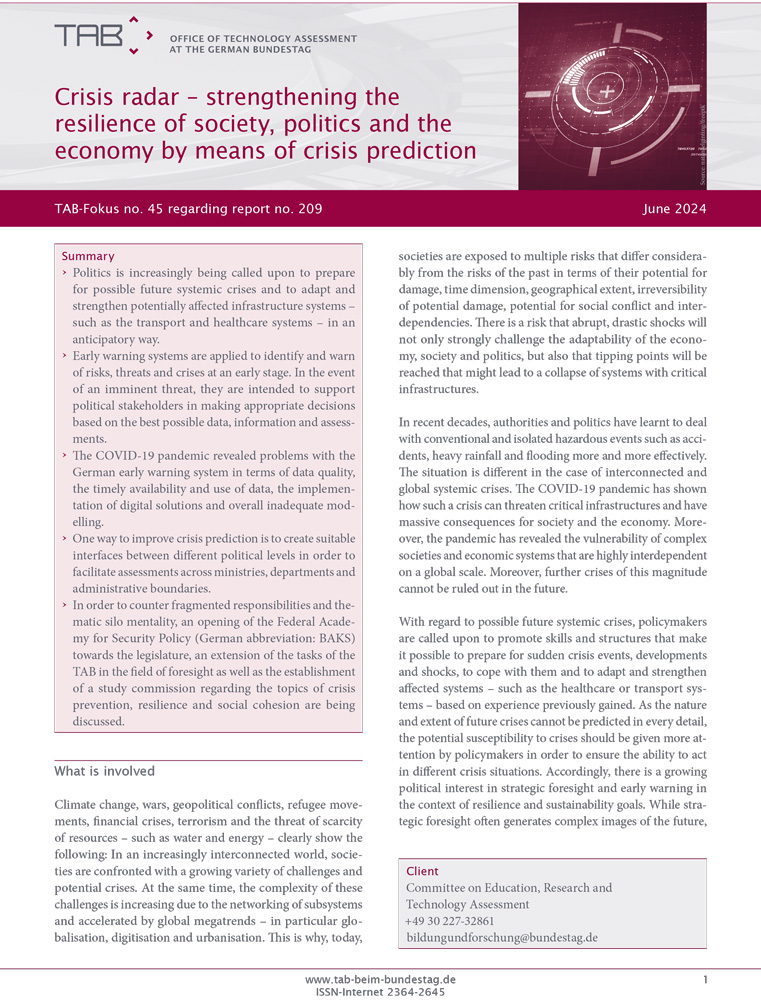Strengthening social, political and economic resilience through better crisis prevention
A multitude of globally interconnected risk situations increases the threat of systemic crises. Over the past decades, a complex system of early warning, risk assessment and crisis management has been developed in Germany, which has largely proved effective in dealing with singular and calculable risks. However, the classical mechanisms are no longer sufficient to adequately address crises of a systemic nature and to maintain the resilience of societies. The TAB study "Crisis Radar - Strengthening the Resilience of Society, Politics and the Economy by means of crisis prediction" identifies the need for political action and makes proposals for better management of systemic risks.
Approaches for improved crisis prediction
In Germany, numerous institutions, authorities and committees at various levels are working on the early detection of crises and the identification of associated vulnerabilities. However, the knowledge gained is often not sufficiently used, networked and integrated into policy processes. The main task for improving crisis prediction is therefore to create appropriate interfaces between the different levels in order to facilitate analysis and assessment across departmental, technical and administrative boundaries. The focus is on the integration, networking, coordination and cooperation of the various political levels, departments and the associated institutions, authorities, early warning systems and instruments.
Several policy options can be derived from the lessons learned from the use of early warning systems, especially during the COVID-19 pandemic. These include expanding early warning systems to include vulnerability analyses, stress tests and resilience analyses of systemic risks in order to identify and reduce structural weaknesses. In addition, policymakers need to pay more attention to comprehensive risk scenarios that focus on the interactions between different policy areas and sectors in the sense of an all-hazards approach. Early warning should also be better supported by modelling and AI to increase the accuracy of predictive models and support the selection of preventive measures and policy decisions.
Transformative resilience as a guiding policy concept
The authors of the TAB study also recommend combining the guiding concepts of resilience and sustainability at the policy level to create a transformative understanding of resilience. Transformative resilience refers to the ability to successfully advance the sustainable development of society under uncertain and changing conditions. In this sense, the existing capacities and structures of the German Bundestag should also be better used for a preventive and transformative resilience policy.
The TAB report places the concept of resilience in the context of current scientific, social and political debates and provides an overview of key areas for action. It presents and analyses international and national early warning systems and how they function, their strengths and weaknesses, in particular during the COVID-19 pandemic, and what lessons can be learned for the early detection of future pandemics and potential crises. A systematic overview of foreseeable future systemic risks is complemented by exemplary resilience analyses of two critical infrastructure sectors, the health system and the transport system, with a focus on road and rail transport, each in relation to the systemic risk of climate change. Weaknesses are identified and approaches for improving resilience are derived. On the basis of the overall analysis, options for action will be derived as to how crisis forecasting and prevention in Germany can be improved in order to strengthen the resilience of the economy and society. A particular focus is on the question of how the issues of early warning and crisis prevention can be more firmly anchored at the level of parliamentary work in the German Bundestag.
The main results are presented in the four-page policy brief TAB-Fokus no. 45 and its web version on the project page. The full report with a detailed summary (20 pages) is available in German only.
26.06.2024
Download and further information
- TAB-Fokus no. 45
Crisis radar – strengthening the resilience of society, politics and the economy by means of crisis prediction (PDF)
doi:10.5445/IR/1000172000 - TAB-Arbeitsbericht Nr. 209 (in German only)
Krisenradar – Resilienz von Gesellschaft, Politik und Wirtschaft durch Krisenvorhersage stärken (PDF)
doi:10.5445/IR/1000171996 - Project page (with TAB-Fokus no. 45 - web version)

